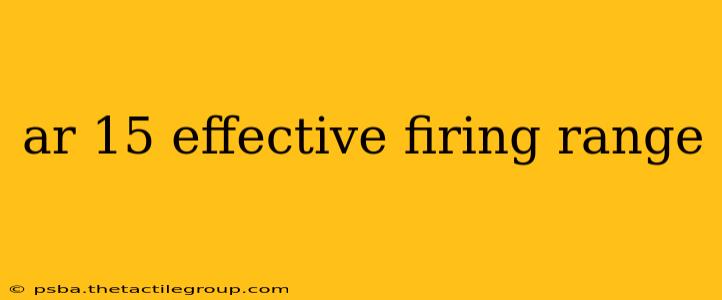The effective firing range of an AR-15 is a frequently asked question, and the answer isn't a simple number. It depends on several factors, including the specific rifle's configuration, ammunition used, the shooter's skill, and environmental conditions. Let's delve into the nuances to provide a clearer understanding.
Defining "Effective Range"
Before we explore the numbers, it's crucial to define what constitutes "effective range." In the context of an AR-15, effective range doesn't simply mean the maximum distance a bullet can travel. Instead, it signifies the distance at which a shooter can consistently achieve hits on a target of a specific size, with sufficient accuracy to accomplish the intended task. This typically involves considering factors like:
- Accuracy: The ability to place shots consistently within a desired group size.
- Precision: The ability to hit a specific point on the target.
- Terminal Ballistics: The bullet's behavior upon impact, considering its ability to cause sufficient damage to neutralize the target.
Factors Affecting AR-15 Effective Range
Several factors interact to determine the practical effective range of your AR-15:
1. Ammunition:
- Caliber: The .223 Remington/5.56 NATO round is the standard for the AR-15. Different ammunition types within this caliber, such as match-grade or full-metal jacket, impact accuracy and effective range. Heavier bullets generally have a flatter trajectory and better long-range performance.
- Bullet Weight and Construction: Heavier bullets generally have less bullet drop over distance, increasing effective range compared to lighter bullets. Bullet construction (e.g., hollow point, full metal jacket) also plays a role in terminal performance at longer ranges.
2. Rifle Configuration:
- Barrel Length: Longer barrels generally increase velocity and accuracy, extending the effective range. Shorter barrels sacrifice some velocity and accuracy at longer distances.
- Optics: The quality and magnification of your scope or red dot significantly influence accuracy at longer ranges. Higher magnification allows for better target acquisition and precision shot placement.
- Handguard and Accessories: A stable handguard, properly mounted accessories (such as bipods or vertical grips), and proper sighting systems impact accuracy.
3. Shooter Skill:
- Training and Practice: Proficient marksmanship skills are critical for maximizing the effective range of any firearm, including the AR-15. Consistent practice and proper training significantly impact accuracy.
- Breathing and Stance: Proper breathing techniques and a stable shooting stance greatly influence shot accuracy and consistency, especially at longer ranges.
4. Environmental Conditions:
- Wind: Wind significantly affects bullet trajectory, especially at longer distances. Strong winds can push bullets off target, reducing effective range.
- Temperature and Humidity: These environmental factors can affect bullet velocity and trajectory, impacting accuracy at longer ranges.
Practical Effective Ranges for an AR-15
While precise figures are challenging due to the variable factors discussed above, we can provide general guidelines:
- Point Target (e.g., Human-sized Silhouette): A skilled shooter with a quality AR-15, appropriate ammunition, and suitable optics can achieve consistent hits on a human-sized target out to approximately 300-500 yards (274-457 meters). Beyond this, the difficulty increases significantly.
- Area Target (e.g., Larger animal): Effective range might extend further for larger area targets, as the margin for error increases.
Important Note: These ranges are estimates based on ideal conditions and skilled shooters. In less-than-ideal conditions, or for less experienced shooters, the effective range will be considerably shorter.
Conclusion
The effective range of an AR-15 isn't a fixed number but a dynamic range influenced by multiple interacting factors. Understanding these factors allows for making informed choices about rifle configuration, ammunition selection, and training to maximize the potential of your AR-15. Always practice safe firearm handling and adhere to all applicable laws and regulations when using your firearm. Remember, safety should always be the top priority.

